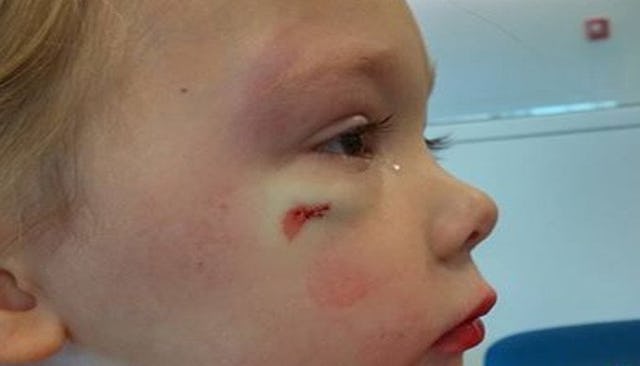4-Year-Old Goes To ER For Stitches And Gets Told Her Bully Must 'Like' Her

When your child gets hurt, you expect the adults around them to offer words of comfort or even remorse. What you don’t expect is for them to make bullshit excuses for the bully who hurt your kid. Unfortunately, that’s what happened to Merritt Smith when she took her 4-year-old daughter to the emergency room for stitches after she was hit in the face by a boy at school.
At Nationwide Children’s Hospital, an employee spoke with them about what happened. She explained the situation and the employee told the child, “I bet he likes you.” Needless to say, Smith was not pleased. She took to her personal Facebook page and lambasted the employee for sending her daughter the message that “someone who likes you might hurt you” and urged adults to take responsibility for the dangerous messages we send to kids with our seemingly “innocent” statements.
Image via Facebook
Since Smith posted her rant, it’s been shared almost 20,000 times and garnered hundreds of supportive comments. It’s resonated with a lot of parents, as most of us were told something similar to this when we were kids.
I can recall several times when adults told me a boy was teasing me, snapping my bra strap, pulling my hair, or doing something equally bothersome because I was pretty or because he had a crush on me. It was confusing because it made me feel like I should be grateful for the attention, even though it was negative and sometimes hurtful. Not only that, but telling a child someone hurt them because they like them absolves the aggressor of responsibility for their actions. It creates an excuse instead of pointing out why they were wrong.
Merritt was right when she said the employee probably didn’t think his statement through. Still, that’s no excuse for perpetuating such a dangerous and ridiculous message. The idea that “boys can’t help it” and “girls should be grateful for male attention” contributes to rape culture, street harassment, and many other forms of violence and aggression towards women, and it starts way earlier than you might think.
The Delaware Coalition Against Domestic Violence reports one in five tweens — that’s kids ages 11-14 — are victims of dating violence. Two in five of the youngest tweens — ages 11 and 12 — report having a friend who’s a victim of verbal abuse in a romantic relationship. As they grow up, these victims are “more likely than their non-abused peers to smoke, use drugs, engage in unhealthy dieting behaviors, engage in risky sexual behaviors, or attempt suicide.” As adults, one in four women is a victim of domestic abuse.
October is National Domestic Violence Awareness month. In honor of that, let’s strive to be aware of our words and the messages they send. Let’s encourage young people to see violence for what it is, which is not an expression of love or admiration. Let’s put an end to the myth that aggression, harassment, or abuse is ever acceptable.